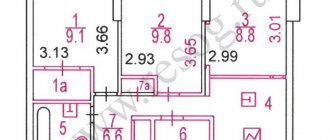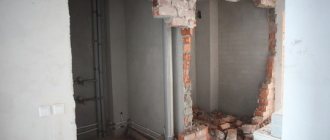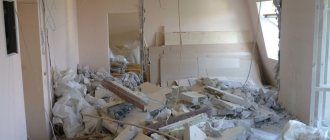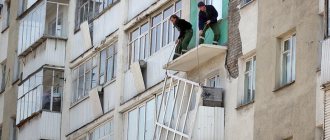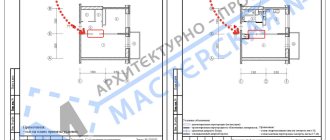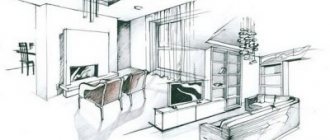Illegal redevelopment - moving the kitchen into the living room (unapproved changes are marked in red)
At the beginning of the article, let's agree on some terms used in it.
Illegal redevelopment of an apartment or non-residential premises is a redevelopment in which the planned or completed work contradicts SNiPs, SanPiNs, regulations and other legal acts, as a result of which it cannot be agreed upon and permission cannot be obtained for it.
Uncoordinated, unauthorized or unauthorized redevelopment is a redevelopment in which the work was carried out without the appropriate permission and approval, but which does not violate construction, sanitary, hygienic and legal standards.
How to legalize illegal redevelopment?
From the definition given above, it becomes clear that it is impossible to coordinate illegal redevelopment. Despite this, we recommend that you send us an email to [email protected] with a request with plans for your illegal redevelopment - perhaps we will be able to come up with something. There are often borderline and complex cases in which the laws can be circumvented with minimal sacrifices. Or you can call us at +7 (495) 507-74-67.
On the contrary, it is possible to legalize unauthorized redevelopment, based on the definition we gave it at the beginning of the article. We have devoted an entire article to this issue, which we recommend that you read. If you want to know the cost of such legalization, then you can also call us on the same phone number +7 (495) 507-74-67, fill out an application or send a request by mail
Responsibility for illegal redevelopment of an apartment or non-residential premises.
If you carried out the redevelopment illegally, then it will no longer be possible to legalize it and the repair work will have to be done again, but in compliance with all standards. Therefore, it is better to initially coordinate the redevelopment before repairs and be sure of its legitimacy. Responsibility for illegal redevelopment lies entirely with the owner of the apartment or non-residential premises.
We talked in detail about the fines and consequences of such redevelopment in a separate article, and if you are interested in this issue, we recommend that you definitely read it. However, we will briefly touch on this issue here. Commentary on the video: With the release of Moscow Government Decree No. 1335 of August 19, 2021, which amended PPM No. 508, the following has changed and is relevant for 2021: 1. The construction of a mezzanine is now allowed to be installed not on 40% of the area of the room in which it is located , and according to clause 10.13 of Appendix 1, the sum of the areas of all mezzanines should be no more than 40% of the area of the entire apartment or non-residential premises. 2. Clauses prohibiting the installation of plumbing fixtures and slabs on mezzanines and the installation of bathtubs, toilets and kitchens on them were removed. Now you can do it. It should not be forgotten that the installation of wet areas above living rooms and kitchens is prohibited according to clause 9.22 of SP 54.13330.2016. It is also prohibited to install a kitchen above the living room in accordance with clause 24 of RF PP No. 47. 3. Clause 10.24 has been added, prohibiting the excavation of soil in basements and ground floors. 4. Added clause 10.25, which does not allow the laying of transit communications through adjacent premises when their boundaries are changed. 5. Added clause 10.26, according to which kitchens with a gas water heater must be separated from living rooms by tightly closing doors with a grate or a gap between the doors and the floor of at least 0.02 sq.m. 6. The impossibility of performing work that requires approval for the project in the non-residential premises of the building, which is the property of the city of Moscow, has been canceled;
SanNPiN 2.1.2.2645-10 was cancelled, which prohibited the entrance to the bathroom from the kitchen or room. Now it is possible.
The fine for legal entities was also reduced from 300-350,000 rubles. up to 40-50,000 rub. in case of carrying out repair work without obtaining prior approval in accordance with paragraph 2 of Art. 7.21 Code of Administrative Offenses of the Russian Federation.
Nothing else has changed.
Reconstruction under the guise of redevelopment is illegal
The owner decided to set up an office in the apartment he owned. The local self-government body issued permission to transfer residential premises to non-residential premises and carry out reconstruction in accordance with the presented project. However, the owner of the apartment carried out reconstruction: a second floor appeared, which significantly increased the total area of the former apartment.
The result of the work did not correspond to the agreed project, so the local self-government body refused to issue an act for putting the premises into operation. The owner did not agree with this decision and went to court.
The first instance did not support the plaintiff, confirming the position of the municipality: the result of the work does not correspond to the design documentation, which did not include the reconstruction of the premises and elements of the apartment building and the addition of the second floor. The issue of reconstruction was not brought up at the general meeting of owners. By his actions, the plaintiff violated the rights of third parties, since he arbitrarily increased his share in the right of common ownership of common property.
The Court of Appeal overturned this decision, holding that the owner could retain the converted premises. The work carried out does not pose a threat to the life and health of other persons, and does not violate their rights and interests. An important argument for the court to make a decision in favor of the plaintiff was the owner’s application for permits to the local self-government body.
The municipality filed a cassation appeal with the Supreme Court of the Russian Federation, which agreed with the conclusions of the trial court. The Supreme Court of the Russian Federation confirmed that the plaintiff violated the requirements of the law by not obtaining the consent of all owners of the premises in the apartment building and the local self-government body for reconstruction. The work performed in the non-residential premises changed the parameters of the area of the former apartment and the common property of the apartment building.
The judge clarified that, according to paragraph 26 of the resolution of the Plenum of the Supreme Arbitration Court of the Russian Federation No. 10 and the Plenum of the Supreme Arbitration Court of the Russian Federation No. 22 dated April 29, 2010, the lack of permission for unauthorized construction cannot be a reason for refusing a claim for recognition of ownership of such a building. It is necessary to establish whether the local self-government body lawfully refused to issue permits.
Since the plaintiff did not apply to the municipality for permission to reconstruct the premises with changes to the elements of the apartment building, the Supreme Court of the Russian Federation canceled the ruling of the appellate authority and decided to consider the appeal again.
The Supreme Court of the Russian Federation on the reconstruction of premises in an apartment building
116510
What are the consequences of illegal redevelopment of non-residential premises or apartments?
For illegal redevelopment, the owner will face a fine and an order to return the violations to their original state.
Let's consider this issue in more detail. Firstly, according to paragraph 2 of Article 29 of the Housing Code of the Russian Federation, the owner will inevitably face punishment for illegal redevelopment of an apartment or non-residential premises in an apartment building if it is discovered in the form of a fine. In Moscow, for individuals it is 2000-2500 rubles according to paragraph 2 of Article 7.21 of the Code of Administrative Offenses of the Russian Federation, for legal entities - 40-50,000 rubles according to the same article. Secondly, according to paragraph 3 of Article 29 of the Housing Code of the Russian Federation, and in Moscow according to paragraph 3.3.3.8.2.2.2 of the App. No. 2 to the 508th Resolution of the Moscow Government for apartments, the owner of an apartment or non-residential premises with illegal redevelopment is issued an order to return the layout of such an apartment or non-residential premises to its original position in terms of the work that violated the law. In other words, the expensive repairs made will have to be returned to their original position. This order is issued in Moscow by an inspector of the Housing Inspectorate, and in other cities of Russia by the corresponding representative of the local government (according to clause 1. Article 26 of the Housing Code of the Russian Federation). If the inspector is not allowed into an apartment or non-residential premises, he will seek access to them through the court. In this way, the detection of illegal redevelopment can only be delayed. If the unauthorized redevelopment has not been eliminated in accordance with the issued order, then the case is referred to the court, which, in accordance with clause 5 of Article 29 of the RF Housing Code, has the right to put such an apartment or non-residential premises up for sale at auction, which has already happened several times on practice.
2.1. Illegal redevelopment - consequences when affecting load-bearing structures.
Illegal repairs in an apartment or non-residential premises that improperly affect load-bearing structures can lead to even more serious consequences, which we described in detail in paragraph 7 of this article. If you are planning or have affected load-bearing structures during repairs, be sure to familiarize yourself with it.
2.2. What are the consequences of illegal redevelopment of an apartment or non-residential premises?
If the unauthorized redevelopment was carried out without violating the current legislation, then the situation is somewhat better. Responsibility for uncoordinated redevelopment, that is, for redevelopment carried out without the appropriate permission, but not violating legal and construction standards, in Moscow provides for the imposition of fines in the same amounts as described above, as well as the issuance of an order on the need for its approval. That is, according to existing standards, such a reconstruction can be legalized in accordance with paragraph 18 of Appendix 1 of the 508th Decree of the Moscow Government. We have already provided a link to an article describing this process at the top. To the question of what kind of redevelopment generally requires approval, we answered here. In the Moscow region, however, local government bodies do not provide for the approval of such redevelopment. They demand its legalization through the court in accordance with clause 4 of Article 29 of the RF Housing Code.
In the vast majority of cases, it is extremely rare to independently carry out the redevelopment of an apartment or non-residential premises without violations, since in our country there are a large number of prohibiting regulations and building standards in relation to its implementation, which we will discuss below. Even if the redevelopment was carried out without violations, then the Housing Inspectors of many districts, in order to legitimize it, require the provision of BTI plans for an apartment or non-residential premises showing the layout changes that have already been made (the so-called “red lines”, which we will discuss below), that is, “ show it to the technical registration authorities even before receiving official permission. In this case, you need to be absolutely sure of the legality of such unauthorized redevelopment, which even experienced specialists cannot always guarantee, since certain cases of redevelopment that are borderline from the point of view of the law can be interpreted by them differently. Otherwise, you will get an unpleasant situation when it was not possible to legitimize the changes made in the layout, but they are already reflected in the BTI plans and you can’t just return them back. Even if the Housing Inspectorate does not require the provision of BTI red line plans for the new layout, then, as mentioned above, the inspector may still find any violations during its inspection and will then issue an order to return the repair to its original state. It should also be noted that the Housing Inspectorate immediately reviews submitted documents for legalization of already completed redevelopment for about three months, while they review documents for the planned layout within a month.
As follows from the above, the consequences of unauthorized reconstruction and redevelopment of an apartment or non-residential premises can be very unpleasant, and therefore it is better to coordinate such work before carrying out repairs. Or at least consult relevant specialists before doing this.
The legislative framework
The main law regulating the process of legalizing the reconstruction of housing in the Russian Federation is the Housing Code of the Russian Federation.
- In particular, Article 25 , which provides the concepts of redevelopment and reconstruction.
- Article 26 describes possible reasons for refusal to legalize such work and defines the basis for their implementation.
- Article 29 describes the consequences of uncoordinated redevelopment for property owners.
How is illegal redevelopment of residential and non-residential premises detected?
Unauthorized and uncoordinated redevelopment of non-residential premises or apartments can be detected in several cases:
- a complaint was received about illegal redevelopment from neighbors due to noise from renovation work, poor sound insulation, personal hostility, and so on;
- when touring the apartment or supervising the management company, if it submits an application for illegal redevelopment to the relevant authorities;
- when the BTI technician leaves;
- for non-residential premises during an unscheduled inspection by the Housing Inspectorate in Moscow;
If the illegal redevelopment has not been identified by the approving authority (the Housing Inspectorate for Moscow or the local government body for the Moscow region) and is not included in the inventory plans (not shown on the BTI plans), then it can be returned to its original position without any instructions. If it does not have any legislative violations (that is, according to the terminology we have adopted in this article, it is simply an unauthorized redevelopment of an apartment or non-residential premises), then it can be approved as soon as it is planned (in other words, retroactively), while saving money and without “highlighting” it in the BTI plans. In this case, it will also be possible to avoid punishment for illegal redevelopment in the form of a fine.
How to avoid punishment or reduce it
The best way to avoid punishment is to act according to the law, that is, agree on the redevelopment in advance. If you proceed in reverse order, you need to be prepared that this is a kind of “lottery”. The court and experts may recognize the possibility of recording the reconstruction in documents, or, conversely, the owner will be obliged to return everything to its original state at his own expense and pay a fine.
To legalize the redevelopment, you need to collect documents, prepare a project and contact the BTI. A special commission will go to the address where the apartment is located, inspect the living space and issue a verdict.
If difficulties arise, please seek legal advice. You can get free legal assistance on our website. in a special window.
Now you know what fine you will have to pay for remodeling an apartment without permission in 2021. To avoid problems, it is necessary to coordinate major repairs in a timely manner. However, if you have already made a redevelopment without approval, you should not despair - contact a lawyer who will help correct the situation with minimal losses.
Illegal redevelopment of an apartment - where to go?
If you want to legitimize illegal redevelopment, that is, repairs carried out in violation of the law, then you will not be able to do this and for this it is better not to go anywhere at all, so as not to “shine it” once again. Unless, as we have already said, you can call us and perhaps we can come up with something to coordinate it.
If you want to legalize unauthorized redevelopment, that is, repairs carried out without violating all laws, then you must contact the Housing Inspectorate if the property is located in Moscow, or the local government body (Administration) if in the Moscow region. However, we strongly recommend that before this you at least simply consult with specialists about your completed redevelopment, so as not to “expose” its possible inconsistencies with construction and legislative standards.
If you want to know where to report illegal redevelopment of your neighbors, we will talk about this below.
What to do if services do not respond
If supervisory agencies are inactive, you need to contact higher authorities. Copies of all requests and responses to them should be kept. This rule applies to all departments, organizations, and courts.
Utility services are supervised by housing inspectorates, administrations, and Rospotrebnadzor. Housing Housing Inspectors are controlled by the Chief Housing Inspector. The prosecutor's office checks for any violations of people's rights. District prosecutors report to city, regional, and federal officials. The courts also have supervisory authorities - regional, regional, republican, and the Supreme Court of the Russian Federation.
Where to complain about illegal redevelopment?
A complaint about illegal redevelopment of neighbors is written to the Housing Inspectorate of your administrative district, if the house is located in Moscow, or to the local government body (city or settlement administration), if the building is located in the Moscow region.
A complaint is written in free form on an A4 piece of paper addressed to the head of the Housing Inspectorate of the given district. The header of the complaint must indicate who it came from (full name, passport details and registration address). In Moscow, only the Housing Inspectorate is entrusted with the authority to control illegal repairs in residential apartment buildings. Neither the district police officer, nor the management company, nor the police are responsible for this and it is useless to contact them. The maximum they can do is to write your request for inspection to the same Housing Inspectorate based on your complaint. You can complain about your neighbors’ illegal redevelopment even without being sure whether it was actually done or not. Thus, you simply ask to check this apartment or non-residential premises for the presence of uncoordinated redevelopment. As we already wrote above, in response to this complaint, an inspector will definitely come to an apartment or non-residential premises and provide an answer based on the results of his inspection. If he is not allowed into an apartment or non-residential premises, then he must seek access to the facility through the police or court.
Sample complaint
Complaints are written in free form and must include:
- addressee's name;
- information about the person applying - his last name, first name, patronymic, address, phone number, email;
- description of the problem;
- demands and suggestions for a way out of the situation;
- Date of preparation;
- providing evidence.
To contact the Criminal Code, you need to describe in detail the inconvenience caused by your neighbors. This includes:
- noise from operating equipment for several days in a row;
- bags of construction waste in the entrance;
- dust and dirt on staircases;
- appeared cracks;
- drips on the walls.
Other residents can confirm the actions of neighbors, photographs of the entrance, damp spots, fragments of bricks, concrete.
Appeals are submitted to the State Housing Inspectorate in the same manner. They can be sent via the Internet. The same documents can be cited as evidence. It is possible to attach an expert opinion on the identified damage.
An application to the prosecutor's office is submitted to the district prosecutor. You can complain both about the actions of residents and about the inaction of other departments. In the latter case, they refer to the responses of the housing inspectorate and the service organization.
The courts work with claims. They are submitted by citizens and organizations. The plaintiff will have to prove the case. In this case, careful preparation is necessary: assessment reports, expert opinions on the causes of identified deficiencies and the possibility of eliminating them will be required. Copies of claims in the Criminal Code and responses to them are required. The text must contain references to legislation. A sample application can be found on stands in court buildings and on official websites.
The free form of appeals presupposes a correct and detailed description of the situation that has arisen, without the use of rude, harsh statements, insults to other people, false information, or speculation. You need to approach writing responsibly. It must be literate and consistent so that the meaning of the message is not lost. The document is signed by the applicant or his representative.
Purchasing an apartment with illegal redevelopment.
As we have already said, all responsibility for the illegal redevelopment lies with its owner. Not on the repair and construction team or the designer, but on the owner. Thus, when buying an apartment with illegal redevelopment, you take full responsibility for it. There are even cases when a person bought an apartment without suspecting anything about the redevelopment carried out in it, or the redevelopment was carried out a very long time ago. All the same, in these cases, it is he who is responsible for the unauthorized redevelopment. Therefore, first of all, you need to take a BTI plan for your apartment. It must be in black lines and without a stamp indicating the presence of uncoordinated redevelopment in the apartment. Then the actual layout of the apartment is compared with this plan. If there are any differences, then redevelopment has been carried out.
Before purchasing an apartment with illegal or unauthorized redevelopment, we strongly recommend that you consult with specialists regarding its legality, the possibility and cost of legalization, as well as the possible consequences. To do this, as we have already said, you can send apartment plans to us by email [email protected] or call +7 (495) 507-74-67.
Illegal redevelopment when buying an apartment can be a very unpleasant surprise. It often happens that we are contacted by an owner who bought an apartment with illegal redevelopment with terrible violations, simply without checking it, and now he is forced to answer for it. We have already written above about the possible consequences of such redevelopments.
How to sell an apartment with illegal redevelopment?
Now let's look at the same situation from the seller's side. Selling an apartment with illegal redevelopment is quite difficult. Firstly, it is necessary to find a buyer who will be ready to purchase such an apartment and take full responsibility for the redevelopment. This puts many buyers off. Secondly, if they agree to such a purchase, many buyers demand a discount on it for subsequent legalization services. Thirdly, the buyer must have “direct money” and not a mortgage, since most banks simply do not approve the purchase of such an apartment. Therefore, it is much easier to sell an apartment with an agreed redevelopment. However, it can be done. There are no restrictions from Rosreestr on this issue.
Cost of services
The price for legalizing redevelopment includes several items.
The amount you will have to pay depends on the complexity of the work performed and how urgently the documents need to be completed.
Costs for legalizing redevelopment:
- cadastral and technical passport will cost up to 2 thousand rubles;
- the cost of the redevelopment project is 8 thousand rubles;
- assistance from an intermediary in developing a sketch and its approval - approximately 10 thousand rubles;
- entering information into Rosreestr - 200 rubles.
Legalization carried out through the court involves increased costs.
Is it possible to approve the illegal redevelopment of a small one-room apartment? How to legalize the redevelopment of an apartment with adjacent rooms? Find out here.
Where to order an apartment redevelopment project? Read on.
Redoing a redevelopment that was not previously approved, during which the norms were violated, will make the procedure even more expensive.
Any work on home redevelopment should be coordinated with the authorized bodies before they begin.
This will insure against unjustified expenses and penalties.
When buying a home, you should carefully study the registration certificate, and when applying for a mortgage loan, you should also study the agreement concluded with the bank.
What is illegal redevelopment of an apartment or non-residential premises?
Now let's move on to, perhaps, the most important part of our article, namely, the consideration of legal acts that cannot be violated when carrying out redevelopment, as well as repair measures that relate to such violations. We have already discussed them in the article “Redevelopment of an apartment - what is possible and what is not,” but we will present the main points here.
In accordance with clause 10 of Appendix 1 of Moscow Government Decree No. 508, the following types of measures include the following types of activities for illegal redevelopment of apartments or non-residential premises for 2021:
- any work that leads to a deterioration in the operating conditions of the house and the living conditions of neighbors, including restricting access to utilities (thus, this includes sewing up heating risers);
- premises renovation activities. as a result of which these premises may be declared unsuitable for living in accordance with the established procedure;
- violation of the load-bearing capacity and stability of capital structures of the building;
- installation of shut-off or control devices on general apartment utilities, if their use may affect the consumption of resources in adjacent rooms;
- elimination and reduction of the cross-section of natural ventilation channels;
- exceeding the permissible load on the building structure when constructing floors, partitions, or installing any equipment.
- transfer of water radiators to loggias, balconies and verandas;
- installation of heated floors from common house hot water supply and (or) heating systems;
- violation of the requirements of construction, sanitary and hygienic, operational standards and fire safety rules for apartment buildings;
- constructing openings, cutting niches, punching holes in pylon walls, diaphragm walls and columns (racks, pillars), as well as in the locations of connections between prefabricated elements (in apartment buildings of standard series);
- installation of fines in prefabricated panels of houses for electrical wiring or sewer pipes;
- transfer of technical underground areas to basements;
- installation of loggias and terraces on the second and higher floors;
- repair work in houses recognized in accordance with the established procedure as unsafe;
- redevelopment of the attic or technical floor;
- combining a kitchen with a gas stove with a living room;
- installation of an external vestibule and display windows extending beyond the external walls of the building;
- combining loggias and balconies with interior rooms;
- constructing and changing the shape of window and door openings in an external wall or roof, weakening the load-bearing capacity of house structures;
- creation of canopies, including glazed ones (within the existing boundaries of the terrace), on exploited roofs, leading to an increase in the height of the building, arrangement of the premises, heating, engineering and sanitary equipment, with the addition of walls, including external ones;
- wiring of ventilation ducts on the main facade of the building;
- installation of attic and dormer windows, leading to changes in roof slopes and ridge heights;
- installation or expansion of mezzanines, the total area of which exceeds 40% of the area of the entire room;
- lower the floor level of basements and ground floors;
- carry out transit engineering communications through adjacent premises when their boundaries change (combination, separation);
- construction of openings between living rooms and a kitchen with a gas water heater without a tightly closing door with the installation of a grille or a gap between the door and the floor with an area of at least 0.02 sq.m.
One of the above points states that redevelopment should not violate the requirements of SNiPs, SanPiNs and fire safety standards, otherwise it will be considered illegal. There are a lot of such requirements. We list several of the most common types of work that turn redevelopment into illegal (links to clauses of regulatory documents are provided in parentheses):
- expansion or location of wet areas (bathrooms, latrines, bathrooms, toilets, laundry rooms, etc.) above living rooms and kitchens (clause 9.22 of SP 54.13330.2016);
- expansion or location of the kitchen under the wet areas of the neighbors above (clause 9.22 of SP 54.13330.2016);
- location of the kitchen above the living rooms (clause 22 of the Decree of the Government of the Russian Federation of January 28, 2006 No. 47);
- location of living rooms or kitchens under the wet areas of neighbors above (clause 9.22 of SP 54.13330.2016);
For unauthorized redevelopment of non-residential premises, these may be:
- absence of a vestibule with a depth of less than 1.2 m. and a width equal to the width of the front door plus at least 0.3 m when entering from the street (clause 3.23 of SNiP 31-06-2009 “Public buildings and structures”);
- incorrect slope of ramps and flights of stairs (clause 5.6 SNiP 31-06-2009);
- lack of a second emergency exit (SNiP 31-06-2009 “Public buildings and structures”);
- and much more (for non-residential premises, in general, there are more requirements than for apartments and it is simply not possible to list them all; designers must be responsible for them);
There are other types of illegal redevelopment, such as connecting a domestic sewage system to a kitchen riser, lack of waterproofing of wet rooms, lack of sound insulation in the floor, lack of a threshold between the bathrooms and the corridor, connecting ventilation from the bathrooms to the kitchen ventilation, etc., but they are less significant if hide them or cleverly play with them.
In some cases, redevelopment may become illegal with such activities that are not clearly stated in the legislation. For example, this could include making an opening in a load-bearing wall in the wrong place.
What is included in unauthorized redevelopment in an apartment building
Some work can be done without legalization by simply registering it with the BTI. These include:
- Increasing the size of the kitchen, bathroom and room due to the corridor or storage room.
- Glazing of balconies.
- Installation of new equipment (without disrupting communications).
- Expansion of the doorway.
- Unification of the bathroom.
For any other intervention in the original housing project drawn up in the technical plan, written permission must be obtained. To do this, you will need an architectural plan for the future housing developed by engineers, confirmation of ownership and signatures of other owners.
If there is neither one nor the other, the repair is considered unauthorized. It will be the same if a positive decision was received from the municipality, but during the renovation process the owner changed the approved architectural design. This will become clear immediately after construction is completed. The controlling organization will appoint a commission that will check the compliance of the work performed with the plan.
Such an object cannot be put into operation until it is brought into the required technical condition. All definitions and rules regarding the approval process are specified in the Housing Code of the Russian Federation, articles 25-29.
Photo: Instagram @mb_designstudio
Work that will definitely not be approved: moving a bathroom to a residential area, demolishing and covering a ventilation duct, closing access to risers and meters, converting an attic, adding an attic, attaching a loggia to floors above the first, demolishing a load-bearing wall, moving water supply risers, etc.
- Kitchen
Kitchens with gas: what repairs are indicated and contraindicated for them
Examples of illegal redevelopment of apartments and non-residential premises.
Illegal repairs made , if they are “exposed”, are marked on the BTI plans of an apartment or non-residential premises in the form of red lines, if the object is located in Moscow. In addition to the red lines, a note is also placed next to the plans indicating the presence of uncoordinated redevelopment in the apartment. In some cities and regions, the changes that have occurred are drawn in black lines, leaving only the corresponding mark. Illegal redevelopment may not be noted in the BTI plan if its inventory was not carried out (a technician did not enter the site), but below, for clarity, we have presented BTI plans with red lines as examples of uncoordinated redevelopments. Below we have moved away from separating the terms illegal and unauthorized redevelopment in the headings of the examples, so below are those redevelopments that cannot be legalized.
Illegal redevelopment of an apartment.
Here is the technical passport of the BTI for an apartment in the red lines. Frequently occurring unacceptable violations have been made in the apartment: the combined bathroom has been expanded to include the kitchen and the gasified kitchen has been combined with the living space. This worsens the living conditions of the neighbors living below them and violates fire safety standards. The penalties for illegal redevelopment of such an apartment will be serious. The bathroom will have to be returned to its original dimensions, and the kitchen will have to be limited by roller shutters or a sliding partition.
Unauthorized redevelopment of the apartment.
This redevelopment was already carried out in the new building. It also included an expansion of the bathroom at the expense of the living room. Coordination of such unauthorized redevelopment is impossible, and therefore the repair will have to be redone and the bathroom returned to its original dimensions.
Unauthorized reconstruction.
In this layout, part of the external load-bearing wall was dismantled under the niche. As we have already said, such illegal redevelopment and its consequences represent the most serious case. I had to order an expensive strengthening project from the author of the house and carry out serious repairs.
Unauthorized redevelopment.
In this example, the main violation is the installation of a new bathroom in the living room. The consequences of such unauthorized redevelopment are also very disastrous.
Illegal redevelopment of non-residential premises.
When carrying out this reconstruction, the builders dismantled the building's rigidity diaphragms, and responsibility for the unauthorized redevelopment of non-residential premises fell on the shoulders of the owner; the diaphragms had to be restored according to a separately developed project.
Uncoordinated redevelopment of non-residential premises.
For this layout, a critical factor is the construction of three openings in the load-bearing walls with a small distance from the enclosing structures. It’s good that the walls held up, otherwise everything could ultimately end in collapse.
We hope this article will help you avoid mistakes in implementing your redevelopment projects, so that you don’t encounter unnecessary problems and incur additional financial costs in the future. We also recommend that you read the article about approving the redevelopment of an apartment.
In what cases should you file a complaint?
It is difficult to detect the redevelopment of someone else's apartment. Questions arise when neighbors are faced with the consequences of repairs:
- long-term operation of construction tools - hammer drills, saws;
- a large amount of garbage;
- the appearance of cracks in the walls;
- sewer leaks;
- ventilation disturbance.
Projects of apartment buildings assume that neighbors share the same amount of water, gas, and electricity. Unauthorized connections and changes to systems may violate the rights of others.
Important : the owner of the apartment being renovated is responsible for the removal of construction waste.
They're tearing down the walls
Demolition of walls between rooms can lead to various consequences, for example, deflection of interfloor ceilings. Sanitary standards for the area of rooms and bathrooms are provided. Increasing the size of rooms and additional openings in load-bearing walls can affect the stability of the entire building and lead to its destruction. It is prohibited to demolish them.
The ventilation was blocked
Ventilation shafts run from the first to the last floor; they allow the air in the rooms to be renewed. Any changes to their design can lead to gas accumulation in apartments and the appearance of dampness. Such violations can be proven after inspection of neighboring housing by specialists from supervisory agencies.
Moved the kitchen to another room
Such redevelopment can cause problems associated with water and sewage leaks. If, after renovations carried out by neighbors, dampness appears in the rooms and this is not due to natural causes, you should find out whether one of the residents has had their kitchen or bathroom moved.
Sewage problems
Sewer risers are located throughout the house. Their movement may impair system performance for other residents. It is possible to detect illegal repairs carried out by neighbors if regular blockages occur and waste flow worsens.
